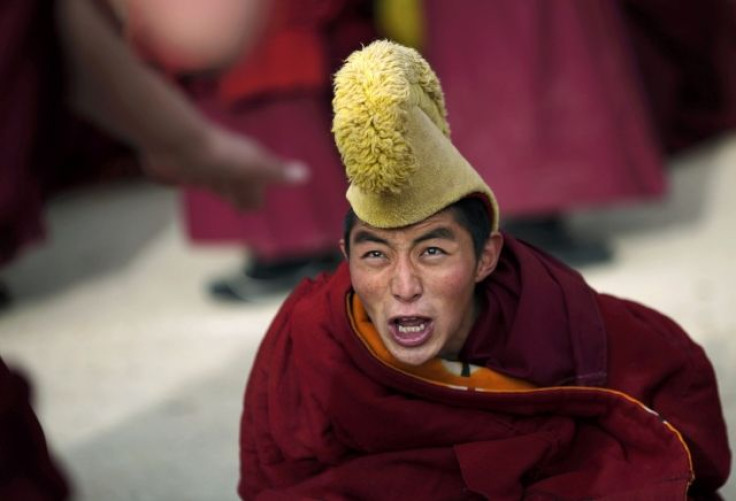China Detains Tibetan Monk For Inciting Self-Immolations

Chinese authorities arrested a monk and his nephew for their alleged roles in inciting a series of self-immolations, state media reported Sunday.
The report in the official Xinhua news agency said the monk confessed to acting on the instructions of exiled Tibetan spiritual leader the Dalai Lama and his followers.
Lorang Konchok, a 40-year-old monk at the Kirti Monastery in Aba County, Sichuan, was accused of provoking eight people to set themselves on fire, three of whom died, since 2009, the report said. The monk’s nephew, Lorang Tsering, 31, who allegedly helped recruit volunteers, was also arrested.
The police said the two suspects, who recorded personal and family information and captured pictures of suicides and passed it on to India, were complicit in facilitating self-immolations.
“As soon as the self-immolation was done, they sent pictures, accounts of the incident and other information to their overseas contacts belonging to the "Tibet independence" organization via mobile phones,” Xinhua said.
The two men were also accused of persuading several people to set themselves ablaze, who abandoned the idea after their families, local government officials and police officers intervened, the report said.
Self-immolations in Tibet saw a steep increase this year, with as many as 29 people setting themselves alight in November alone, according to a Reuters report.
Since 2009 there have been 94 self-immolations, the Tibet-government-in-exile says. At least, 77 people have died from their injuries.
China calls the Tibetan self-immolators terrorists and reportedly released a documentary in mid-May accusing the Dalai Lama of orchestrating a wave of self-immolations by Tibetans.
However, the Tibetan government-in-exile has denied that the Dalai Lama or other exiled Tibetan monks are responsible for inciting the protests. The Dalai Lama has been living in exile in Dharamshala, India, since 1959, after fleeing a failed uprising against the Chinese rule in Tibet.
Beijing on Friday slammed Washington for stating that Chinese policies in Tibet were the reason behind Tibetans setting themselves on fire, the AFP reported.
On Wednesday, U.S. Special Coordinator for Tibetan Issues Maria Otero expressed concern over the burnings and called on China to allow Tibetans to "express their grievances freely.”
Official Chinese rhetoric "that denigrates the Tibetan language, the Dalai Lama, and those who have self-immolated has further exacerbated tensions", Otero said in a statement.
China's foreign ministry criticized Otero’s statement as an "interference in China's internal affairs.”
"The relevant statement by the U.S. official did not criticize the Tibetan splittist activity of the Dalai Lama group and Tibet independence forces, but instead criticizes and blames the Chinese government policies," Hong Lei, spokesperson for China's foreign ministry said.
The newly elected Communist Party chief Xi Jinping, had promised to "smash" Tibetan separatism in a speech in July last year, to mark the 60th anniversary of the Chinese Communist takeover of Tibet.
© Copyright IBTimes 2024. All rights reserved.












